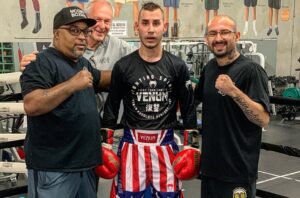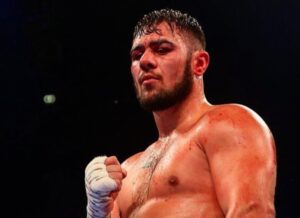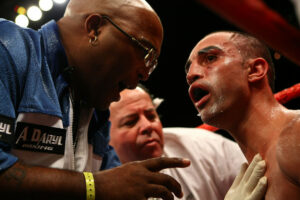“I’d rather them be mad at me, for a day or two, than be mad at me for the rest of their life”, explained an impassioned, yet crestfallen Buddy McGirt following Friday’s contest between his charge, Maxim Dadashev and challenger, Subriel Matias.
There would tragically be no difference between both options presented by the Hall of Fame inductee, as the brave, beaten Dadashev passed away yesterday, another loyal yet unrewarded servant to our sometimes inexplicable addiction.

McGirt’s tone differed from our celebratory interview only a month prior – yet this wasn’t the first time he’d tangled with mortality. Former world title challenger, Matt Macklin confirmed McGirt had shown him similar humility, when pulling him out of their fight with Sergio Martinez way back in 2012, with the Argentine also victorious after eleven rounds.
Macklin, now a healthy thirty-seven and with a successful, blossoming career in boxing media, was commentating almost twenty-four hours and 3,640 miles later, watching likeable Doncaster heavyweight Dave Allen attempt to unsettle David Price with crude, ineffective raids.
Price, a former Olympian and enormous physical specimen, pounded the smaller man from range with snapping uppercuts and tram-like straight rights. It was uncomfortable. Allen decided he couldn’t continue and retired on his stool, perhaps even too late for some close observers. He was given oxygen, surrounded by medical personnel and taken out of London’s O2 Arena on a stretcher.

Thankfully, with a badly swollen eye and a stitched tongue, he lives to fight (or not) another day.
The Dave Allen contest stayed with me, however. A man who was praised and almost elevated into dangerous contests based on his ability to absorb heavy punishment, rattling his brain from undercard to undercard. There’s an ominous Cuban who needs a victory, you say? Call the White Rhino. The powerful Olympic gold medalist needs somebody to pulverise? We know just the man.
Allen’s emotional fragility has almost always been overlooked, in favour of his infamous, tough guy facade and ability to shift tickets. The big, brave man who’ll defend with his face and heal with his heart. When he was stretchered out of the venue on Saturday, there was a sombre sense of, ‘We should have seen this coming’, that stained the occasion. But it was too late. We were party to the situation.

The right time to withdraw a fighter will perhaps never be measurable. It is dependent on so many variables, including; the corner’s decision making, the style of fighter, opposition’s physical state, bout scoring, audience perception, fighter’s reputation or their relationship with their head trainer.
Also, it’s worth pondering where the burden of responsibility lies. If it’s not the trainer, then surely the referee has to make a call for the benefit of the athlete. He is there of course to ensure rules are obeyed, but also to protect both fighters.

Or how about the fighters themselves? Dave Allen recognised things weren’t right, so made the call himself. Former Olympian, Anthony Ogogo had shrugged off the disappointment of injury for so long that he’d sold his home and risked permanent blindness – all for boxing. Should it be up to them, to peel back their mask of invincibility and trudge back to the dressing room, defeated?
It’s a lot to consider when shots are raining down, each one tip-toeing closer to the point of no return. Making the call too early can ruin a fighter’s career, reduce their earnings or destroy that trust, established over countless gruelling hours in the gym behind closed doors.
Too late, though, and the chance to rebuild all of the aforementioned is snatched from underneath them. I’d always favour too early, wouldn’t you?

After the passing of Maxim Dadashev and the continuous beating of Dave Allen, social media has once again erupted with contradictions, stupidity and an alarming disdain for fighters. The most astonishing of all, have been the comments sent FROM fighters aimed at either Allen or Dadashev’s suffering trainer, Buddy McGirt.
It’s not the purpose of this piece to shed light on some of the disgusting comments banded across the internet – you’ve seen them, no doubt. But consider how this, too, could affect the timing of a surrendered, white towel or a fighter’s most honest submission? To be tarred with those hurtful adjectives in a sport of masochistic endeavour is surely insufferable.
The fighters of our era have yet to slip into their later years, however those from generations before have suffered. This isn’t a couple of rickety knees after a decade playing hockey. It’s not a bad elbow after a decent, national badminton career. It’s broken hands, pissing blood and the whiplash effect that a punch has on the brain. Over and over and over.

It’s a beautiful sport, boxing, stripped back and simple. It changes lives and provides hope to those who never stood a chance. To make that decision within that split-second is rarely achievable. Things happen. We’ve all watched the recent clip of Sam Maxwell, floored various times himself, yet winning in the last five seconds with a stoppage. Boxing sells us that fairytale ending.
A day or two was all Maxim Dadashev had left. Yet the man in his corner, a good man, a man that cared about the loving, young father and husband, will be left asking himself the burning question. Did he do enough? Was it too late?
Buddy McGirt has proven himself, long before this past Friday. As clips circulate of him staring into Maxim’s eyes, pleading with him to quit the fight, it becomes more than boxing. Dadashev trusted McGirt and as he watched his trainer signal the end of the fight, through tired eyes, he didn’t fuss or frown. The rest of the team didn’t argue or force the issue of seeing the final bell – they knew. Like all true, great fighters, he had left it all in the ring.
Feature written by: Craig Scott
Follow Craig on Twitter at: @craigscott209